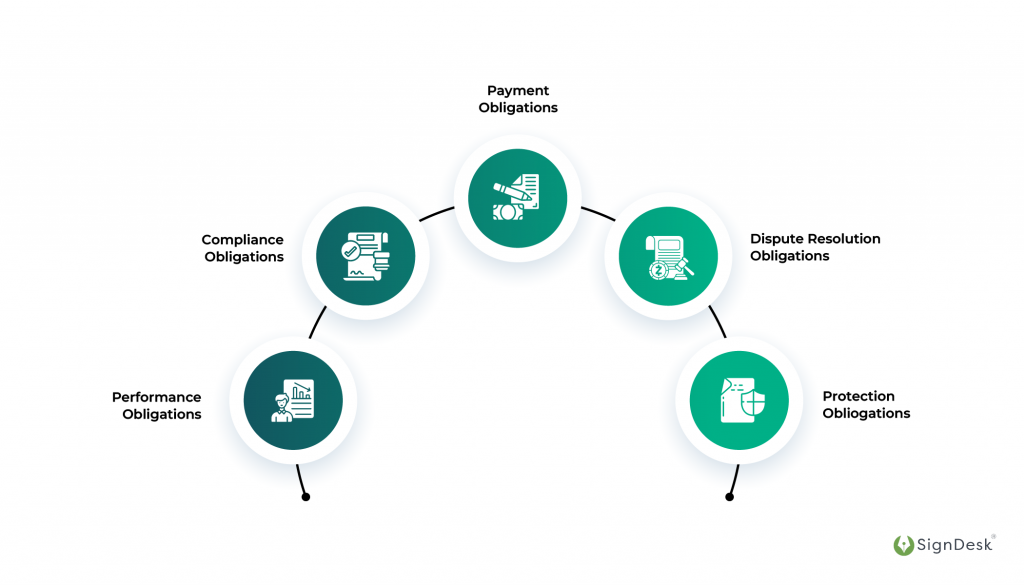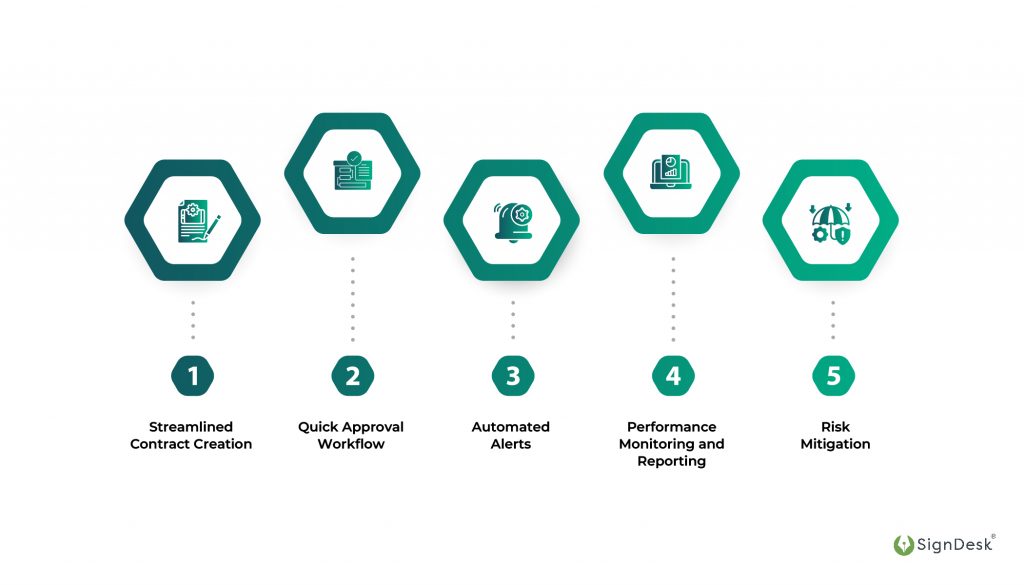Contracts serve as the backbone of business relationships, providing a foundation of trust, clarity, and accountability. Contractual obligations are at the core of every contract, ensuring all parties know their responsibilities and are held accountable for their actions.
Understanding the dynamics of contractual obligations is essential for navigating the complexities of modern business. Businesses can better comprehend the foundation for their contracts, enabling them to forge robust and mutually beneficial relationships.
This article focuses on the significance of contractual obligations, their different types, and the consequences businesses can face if they fail to fulfill them.
What are Contractual Obligations?
Contractual Obligation Meaning: Contractual obligations are the commitments, responsibilities, and duties that parties undertake when entering a contractual relationship. They are legally binding duties that need to be fulfilled according to the terms and conditions outlined in the contract.
Key Components of Contractual Obligations
Contractual obligations are built on several essential elements that ensure parties meet their responsibilities. A well-drafted contract is built on these essential components which prevent misunderstandings and potential disputes.
A contractual obligation has the following elements:
- Promise: A commitment to perform a specific act or service.
- Party: The individual or organization responsible for fulfilling the promise.
- Scope: A clear explanation of what is included and excluded from the obligation.
- Standard: The expected level of quality or performance.
- Timeframe: The specific date, duration, or milestone by which the obligation must be completed.
- Conditions: Specific requirements or events that have to occur before the obligation is triggered.
- Consideration: Something of value (e.g., money, services) given in exchange for the promise.
- Obligor: The party responsible for carrying out the obligation.
- Obligee: The party to whom the obligation is owed.
- Dispute Resolution: Clauses that address how disagreements about the obligation are settled.
Contractual Obligations – Real-World Examples
Here are some examples of contractual obligations:
- Payment Obligation: A customer agrees to pay a software company for a license to use their software.
- Delivery Obligation: A supplier agrees to deliver 1000 product units to a retailer by a specific date.
- Service Obligation: A consulting firm agrees to provide marketing services to a client for at least six months.
- Confidentiality Obligation: Employees agree not to disclose confidential information about their employer’s business.
- Non-Compete Obligation: A former employee agrees not to start a competing business within a certain geographic area for a specified time.
- Indemnification Obligation: One party agrees to compensate another party for losses or damages resulting from a specific event.
Types of Contractual Obligations: A Breakdown
Different types of legal obligations in contracts are crucial for businesses to navigate agreements, manage risk, and ensure compliance. These obligations include:

- Performance Obligations: These outline the specific actions or services that one or both parties must perform. This can include:
- Delivering goods or services by a certain date
e.g., a construction company agrees to build a house within six months.
- Completing a project within a specified timeframe
e.g., a software developer agrees to deliver a mobile app within three months.
- Meeting specific performance metrics or standards
e.g., a logistics company agrees to achieve a 99% on-time delivery rate for a client’s shipments.
- Compliance Obligations: These obligations require parties to comply with relevant laws, regulations, or industry standards. This can include:
- Data privacy laws
e.g., GDPR, HIPAA.
- Financial regulations
e.g., tax compliance, financial reporting.
- Environmental regulations
e.g., pollution control, waste management.
- Payment Obligations: These obligations specify the payment terms, including:
- Amount and frequency of payments
e.g., a customer agrees to pay Rs. 10,000 upfront and Rs. 5,000 monthly for six months.
- Payment method
e.g., bank transfer, credit card.
- Payment schedules
e.g., milestone-based, recurring.
- Dispute Resolution Obligations: These outline the process for resolving disputes that may arise, such as:
- Mediation or arbitration procedures
e.g., the parties agree to use a mediator to resolve disputes.
- Dispute resolution timelines and deadlines
e.g., disputes must be resolved within 90 days.
- Governing law and jurisdiction
i.e., which laws and courts will apply.
- Protection Obligations: These obligations require parties to protect sensitive information or assets, which can include:
- Confidentiality agreements
e.g., non-disclosure agreements (NDAs).
- Intellectual property protection
e.g., patents, trademarks, copyrights.
- Data security and privacy measures
e.g., a company agrees to protect customer data in accordance with GDPR regulations.
What Happens When Businesses Fail to Fulfill Contractual Obligations?
When a party fails to fulfill its agreed-upon commitments and responsibilities, i.e., its contractual obligations, a breach of contract occurs. When businesses fail to meet their contractual obligations, severe consequences can impact their reputation, finances, and relationships.
Below are some examples of contract breaches:
- Failure to pay for goods or services as agreed.
- Failure to deliver goods or services on time.
- Delivering goods or services that do not meet the agreed-upon standards.
- Failure to perform a specific obligation or service
Here are the consequences businesses have to face in the case of failure to fulfill contractual obligations or breaching a contract:
- Reputational Damage: This can lead to a loss of trust and credibility with customers, vendors, and partners. This negatively impacts business reputation and goodwill, making it challenging to attract new customers and retain existing ones.
- Financial Consequences: Businesses that violate contractual policies may be subject to hefty fines or other monetary penalties based on the nature of contractual obligations. In addition, contract termination may incur expenses for litigation, arbitration, or mediation in addition to lost income and profits.
- Legal Action: The aggrieved party can file a lawsuit and ask for particular performance orders or injunctions. Criminal charges might be brought in certain situations if the breach is considered false or deliberate.
- Contract Termination: This is another consequence that means giving up all rights and benefits and needing the return of any security deposits or advance payments.
- Loss of Business Opportunity: A contract breach may also result in lost revenue and expansion prospects, damaging relationships with suppliers and partners, and missed business chances.
- Regulatory Action: Non-compliance with contractual obligations can result in regulatory action, including investigations, penalties, and legal action by government agencies and regulatory bodies, which may lead to fines, penalties, or sanctions.
How Can Businesses Leverage CLM to Ensure Contractual Obligations are Fulfilled
Ensuring that contractual obligations are met is critical to maintaining trust, managing risk, and fostering long-term partnerships. Contract Lifecycle Management (CLM) software is a powerful tool for businesses to streamline and optimize the entire lifecycle of contracts.
Here’s how businesses can effectively utilize CLM software to ensure their contractual obligations are fulfilled:

- Streamlined Contract Creation: CLM software solutions offer standardized templates that help businesses quickly and accurately generate contracts.
- Quick Approval Workflow: CLM facilitates streamlined approval processes that businesses can configure based on criteria like contract type, value, etc. This allows contracts to be approved more quickly, which saves time and ensures timely execution.
- Automated Alerts: CLM software sends notifications for contract milestones, such as payment schedules, renewal dates, or performance reviews. This proactive approach helps businesses stay on top of their obligations and take timely actions when necessary.
- Performance Monitoring and Reporting: CLM helps businesses track contract performance against predefined metrics and Key Performance Indicators (KPIs). By incorporating contract redlining and generating real-time reports and analytics, businesses can identify areas that require attention and receive insights on contract performance.
- Risk Mitigation: CLM helps identify and mitigate risks associated with contractual obligations. Businesses can proactively manage risks by analyzing contract terms before they impact their operations or relationships.
Manage Contractual Obligations Effectively with SignDesk Contr.act
Fulfilling contractual obligations is crucial for businesses to maintain reputation, trust, and financial stability. Businesses must utilize Contract Lifecycle Management (CLM) software to streamline and manage their contracts effectively.
SignDesk Contr.act is an advanced CLM solution offering a comprehensive commercial contract management platform. With its advanced features, including milestone and obligation management, a centralized repository, automated reminders, a low-code form builder, and contract analytics, Contr.act enables businesses to efficiently manage their contracts and ensure fulfillment of contractual obligations.
Contr.act offers effective contract management solutions for various industry sectors, including manufacturing, real estate, healthcare, energy, agritech, and more. Want to see how SignDesk Contr.act can transform your contract management process? Book a free demo and discover how we can help you streamline your contractual obligations, automate workflows, and ensure compliance with ease.